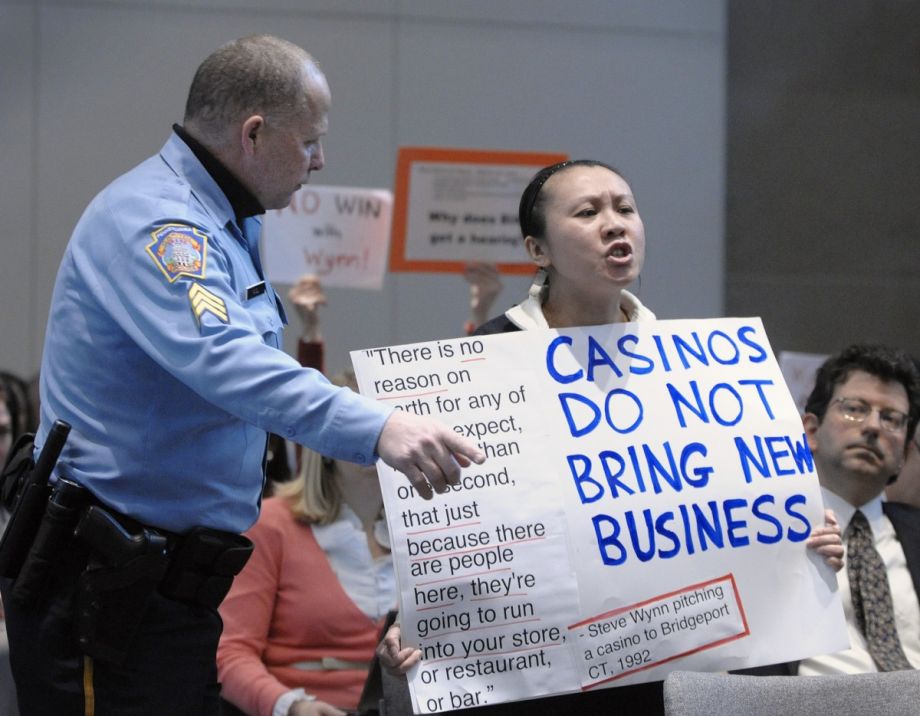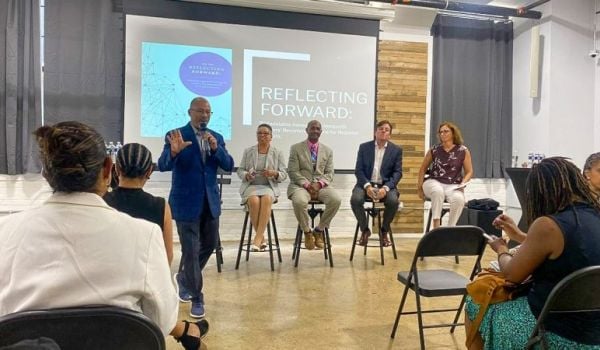Despite evidence that casinos are not generators of urban economic growth and that the northeastern U.S. is nearing gaming oversaturation, Philadelphia continues to look forward to its second state-approved casino license. Deputy Mayor Alan Greenberger recently told the Philadelphia Inquirer that the city hoped for a decision from the Pennsylvania Gaming Control Board by summer’s end.
Recent weeks have seen a couple new developments. One bidder put forward a proposal for an off-brand Space Needle as part of their proposed complex. Philadelphians needn’t worry about appearing hopelessly provincial — it’ll be 10 feet taller than its Seattle counterpart! (The derivative embarrassment would grow greater in 2015, when, across the Delaware River, Camden hopes to open a Space Needle knockoff amid its menagerie of riverfront boondoggles.)
Last week, the field narrowed when Penn National Gaming dropped out, leaving four contenders. The company president’s press release didn’t just contain the usual pablum. He also highlighted two of the big questions haunting the licensing process. Should Philadelphia’s second casino be housed in one of the less happening stretches of Center City in hopes of revitalization? (Penn National’s plans were for a South Philadelphia site near the city’s stadiums.) Should Philadelphia even be getting a second casino at all?
“A contributing factor in our decision to withdraw our proposal was the City of Philadelphia’s vocal support for a Center City casino location,” wrote the retreating head of the company, Timothy J. Wilmott. In a September hearing before the Gaming Control Board, Greenberger rated the various entrants based on criteria including job creation, revenues generation and the possibility of economic development in the surrounding area. But the evidence for casinos as a form of urban revitalization is unclear. “The literature … tends to be, at best, descriptive or anecdotal,” wrote Alan Mallach, in a 2010 survey of the literature on the economic effects of casinos for the Philadelphia Federal Reserve.
The chief anecdote among industry opponents is Atlantic City’s perennial decrepitude — often cited as evidence that casinos cannot buoy a city’s future. But A.C. is an exceptional case due to its decades-long monopoly of the mid-Atlantic market. Gaming’s presence certainly buoyed South Jersey with tens of thousands of good, unionized working-class jobs, but the host city did not fare so well. Windowless casinos seemed to almost foster the surrounding city’s dismal conditions. Dozens of local small businesses closed. But a single casino, even in a less than bustling part of downtown Philadelphia, would not have a comparably deadening presence. (One bidder’s project even sports windows.) Even considering the industry’s tacit acceptance of Atlantic City’s decline, it’s hard to argue that it isn’t better off than comparably-sized Chester, Pennsylvania — now home to its own lone casino.
“Casinos are economic drivers in the sense that they provide a lot of jobs and tax revenue to the governmental entities that sponsor them,” said Greenberger in March 2013. “I haven’t seen them generate local economic development. Yet.” The city hopes that a casino might breathe some life into Center City’s unevenly developed North Broad Street or sometimes seedy Market East. But even if Atlantic City’s shabby example isn’t the necessary outcome, there also isn’t any evidence that a downtown casino will revitalize its surroundings.

A Casino-Free Philadelphia supporter at a Pennsylvania Gaming Control Board hearing (AP Photo/Jason Minick)
“The Center City locations offer the potential to attract new customers to the gaming industry, in part from the nearby convention and visitor activities,” Mayor Michael Nutter’s press secretary, Mark McDonald, told me in an email. “From the experiences of SugarHouse, we have not seen a drop in business for restaurants and other entertainment venues. Philadelphia is a big city with a large customer base and discretionary entertainment budget.”
Philadelphia is far larger than most other localities that have experimented with urban casinos, but Mallach’s survey includes reasons for skepticism. In contrast to Atlantic City and Las Vegas, most of the regions he reviews didn’t attract much tourist trade. Detroit is the only urban area remotely comparable to Philadelphia in his work: 80 percent of its customers came from the city’s metro region. The Las Vegas model cannot be replicated by big hotels, concert halls and tacky homages to other city’s landmarks. Other casinos can only aspire to Las Vegas’ style: The real thing dominates America’s destination gambling trade.
And if you aren’t a destination for those outside your region?
“If you aren’t bringing in money from the outside you are really exporting money to casino owners and the state capitol,” says Paul Boni, a Philadelphia attorney and board member of the national advocacy group Stop Predatory Gambling. “It damages the local economy rather than helping it. There’s no evidence that people are going to have a nice dinner afterwards or go see a show. Local convenience gamblers, not to mention problem gamblers, that’s not the purpose of their visiting the casino. They aren’t interested.”
A recent report by the National Association of Realtors piles on the bad news. Home values are often negatively affected by the presence of a nearby casino, and the authors are not sanguine about the economic benefits of city casinos. “Indian casinos in very rural areas are frequently cited as generating significant local economic benefits, largely due to the depressed nature of the local economy,” they write. “This has not generally been the case for urban casinos.”
Wilmott’s other parting barb jabs at another unresolved problem.
“The market potential in Philadelphia is less today than when we first applied, as a result of the ongoing gaming saturation in the mid-Atlantic region, as well as continued softness in the economy,” he concludes. Twenty-six new casinos have opened across the northeastern region since 2004 and analysts believe the market is close to saturated.
Philadelphia’s first casino, SugarHouse, is using catastrophic language to forestall the competition. “We cannot survive this,” their general manager told the Gaming Board in January. “The second Philadelphia license should be issued to no one. Because this action right now will decimate the southeastern PA casino industry.”
In reality, the second casino will probably turn a profit and SugarHouse will stay afloat, although it will be surprising if either is remarkably successful. As the NAR report notes, “Casinos that are close to each other tend to split the available business, reducing profitability.”
Beyond moderate profits and tax revenues, Philadelphia’s next casino — be it an architectural gimmick or a pseudo-Parisian “integrated urban entertainment” complex — will probably be a disappointment as a vehicle for urban revitalization, local economic growth or good jobs (those are already being lost in Atlantic City). That hardly seems worth the risk of gaming.
The Equity Factor is made possible with the support of the Surdna Foundation.


















